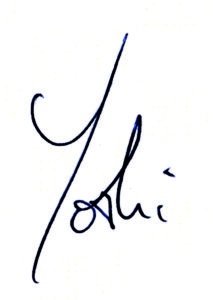On this day, 113 years ago, my grandfather Joe Zweiback was born. I remember as a child gathering with my family to celebrate the special occasion and he would invariably say, “All of France is celebrating my birthday today!”
Every summer I worked in my grandfather’s Vitamin Store helping to stock the shelves, dust the bottles of vitamins, empty several days’ worth of condensation from the trays of water under the refrigerator, and—best of all—ring up orders on his manual cash register. The best part was pulling down the lever that opened the cash drawer and simultaneously rang a little bell.
Over the years working with him, he taught me many valuable lessons, one that has particular resonance for me this week. “Sonny,” he once said to me, “in business, Grandpa’s word is his bond.” You didn’t need a signed contract from Joe Zweiback. A verbal agreement sealed with a handshake was all that was required. If he said it, he meant it, and you could be sure that he’d stand by it.
In this week’s Torah reading, the last in the Book of Numbers, we learn:
|
אִישׁ כִּי־יִדֹּר נֶדֶר לַיהֹוָה אוֹ־הִשָּׁבַע שְׁבֻעָה לֶאְסֹר אִסָּר עַל־נַפְשׁוֹ לֹא יַחֵל דְּבָרוֹ כְּכׇל־הַיֹּצֵא מִפִּיו יַעֲשֶׂה׃ |
“If a person makes a vow to the ETERNAL or takes an oath imposing an obligation on themselves, they shall not break their pledge; they must carry out all that has crossed their lips.”
—Numbers 30:3
If you make a vow, known as a neder (נֶדֶר) in Hebrew, you must stand by it. (This is, by the way, why our tradition wants us to be so careful with making vows lest we fail to fulfill what we have promised and thereby commit a sin. To avoid this, there is a custom of saying b’lee neder as in, “I’ll see you this Shabbat at your daughter’s bat mitzvah, b’lee neder!” which means: “I’ll try my best to be there but I’m not making a vow that I might end up breaking!”)
In our tradition, promises made should be promises kept. Our word should be our bond.
Shabbat Shalom,

—Rabbi Yoshi
